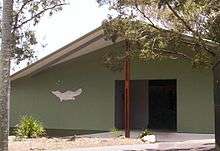Lone Pine Koala Sanctuary is an 18-hectare (44-acre) Koala Sanctuary in the Brisbane suburb of Fig Tree Pocket in Queensland, Australia.
Founded in 1927, it is the world's oldest and largest koala sanctuary.
History
The name originates from a lone hoop pine that was planted by the Clarkson family, the first owners of the 4.6-hectare (11-acre) site.[1]
The sanctuary began with two koalas called Jack and Jill.[1] Lone Pine became known internationally during World War II when Americans, including Douglas MacArthur's wife, visited the park to view the native Australian animals.[1]
Wildlife
-Acoustic-Analysis-and-pone.0020329.s001.ogv.jpg)
A bellowing male koala in the sanctuary.
Wildlife in the sanctuary includes: koalas, kangaroos, Tasmanian devils, wombats, echidnas, and various species of reptiles, as well as a platypus that arrived at the sanctuary during 2010 from Healesville Sanctuary (near Melbourne).
Visitors are allowed to hold koalas for free.[2] Strict regulations ensure that each koala is not held for more than thirty minutes every day. Fees paid for souvenir photos help fund new enclosures, research projects and eucalyptus plantations.
Visitors can also feed and pet the free-roaming kangaroos in the 5-acre (2.0 ha) kangaroo reserve, where more than 130 of the animals freely reside.
There are also many colourful Australian parrots and cockatoos, as well as other Australian birds such as kookaburras, emus, and cassowaries. Rainbow lorikeets fly to the Lone Pine Koala Sanctuary for the specially prepared nectar meals at the sanctuary. Visitors can feed the lorikeets directly twice a day. Once a day there is a bird of prey show with several kinds of raptors showing off their speed agility and keen eyesight.
The Tasmanian Devils are fed in the afternoon. 'Koala Forest' is a large koala enclosure with over 30 koalas surrounding the customers. Koalas there are fed mid-morning and mid-afternoon.
As well as being a wildlife sanctuary, there is a small 'farm', with "Sheep Dog Shows".
Transport
There is an entrance to the sanctuary from a car park, and also an entrance to the sanctuary from the Brisbane River. One can arrive by private car or taxi, a journey of approximately 20 minutes from the city. One can also catch a Brisbane Transport bus, or arrive by ferry from the Queensland Cultural Centre pontoon, a journey of approximately 1½ hours.
Photos
| Koalas at Lone Pine Koala Sanctuary |
| Koala walking along a branch at Lone Pine Koala Sanctuary |
| Mother and baby Koalas at Lone Pine Koala Sanctuary |
| Greeting visitors to Lone Pine Koala Sanctuary at the boat ramp (now discontinued) |
| Squirrel Glider at Lone Pine Koala Sanctuary |
| Kangaroos at Lone Pine Koala Sanctuary |
| Kangaroo at Lone Pine Koala Sanctuary |
| Rainbow Lorikeets at Lone Pine Koala Sanctuary |
| Rainbow Lorikeets at Lone Pine Koala Sanctuary |
| Rainbow Lorikeets at feeding time at Lone Pine Koala Sanctuary |
| Emus in Lone Pine Koala Sanctuary, Queensland, Australia |
| Rocket the Barking Owl enjoying a reward at Birds of Prey display |
| Barn Owl at Birds of Prey display |
| Platypus House at Lone Pine Koala Sanctuary |
|
See also
References
External links
-Acoustic-Analysis-and-pone.0020329.s001.ogv.jpg)










